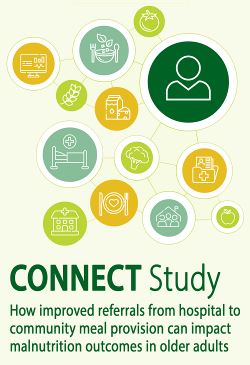CONNECT Study
 Study Overview
Study Overview
The CONNECT Study is a national research initiative testing a new model of nutrition care that bridges hospitals and community meal providers to support older adults diagnosed with malnutrition and food insecurity. The model enables referral and continuity of nutrition care from the hospital to the community, facilitated by Registered Dietitian Nutritionists (RDNs) using ANDHII (the Academy of Nutrition and Dietetics Health Informatics Infrastructure).
This study uses a Hybrid Type 2 Effectiveness-Implementation design, embedded within a stepped wedge, to ensure all participating hospital–community site pairs have the opportunity to implement the intervention. The intervention includes an electronic referral to RDNs in the community, medical nutrition therapy (MNT), the provision of home-delivered and congregate meals, and medically tailored meals as part of a broader Food as Medicine approach following hospital discharge.
The CONNECT Study also includes enhancements to ANDHII. ANDHII is a secure online registry that collects nutrition care data and tracks MNT related outcomes. These updates include improved reporting features, bug fixes, the ability to extract data from electronic health records (EHRs) and coordinated referrals across clinical and community settings.
- Executive Summary (PDF)
- CONNECT Study Overview Slides (PDF)
- CONNECT Protocol Poster (PDF)
Aims of the CONNECT Study
The aims of the CONNECT Study are:
- To test the feasibility of a referral process model that involves patient identification, cross-referral, data reporting, and communication (including data transfer) from an acute care hospital (clinical site) to a meal provision organization (community site).
- a. To identify barriers to and facilitators for implementation of the referral process model and approximate costs.
- To determine if there is an increase in the proportion of patients >60 years with malnutrition receiving MNT and meal provision in the community setting when comparing usual care with the new referral process model at participating sites.
- Evaluate whether the new referral model improves quality of life (QoL), food security, and measures of malnutrition characteristics in older patients (> 60 years) diagnosed with malnutrition relative to patients receiving usual care.
Timeline
Data collection is scheduled to begin Summer 2025 and continue for 35 months across five 7-month periods, with rolling start dates and using a stepped approach to transition sites from usual care to the intervention. Expected completion: Spring 2028.
Recruitment
Recruitment is now closed. All 16 participating site pairs (hospital and community organization) have been selected. We are grateful for the broad geographic and demographic representation across our clinical and community sites.
If you are interested in future research opportunities, please contact us.
References
Join the Academy
Members of the Academy of Nutrition and Dietetics receive exciting benefits including complimentary continuing professional education opportunities, discounts on events and products in eatrightSTORE.org, invitations to exclusive members-only events and more!
